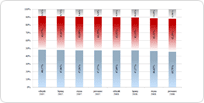Hakom - Croatian Post and Electronic Communications Agency
e-Agency
Users:
Cost Estimator
The Holder of Framework Programme
GIS portal
Privacy calculator
Application ''Quiz''
Market survey
HAKOM published “Fibre to the Building…” brochure
PRESS RELEASEHAKOM published a practical, educational and informative brochure for all co-owners of residential and business buildings entitled “Fibre to the Building…” with a view to introducing them to the fibre-optic technology and informing them about the need for and advantages of fibre-optic installations. On this occasion, it also published a template of a framework agreement that may be used for regulating relations with the operator.
ZAGREB, 4 July 2014 – HAKOM published a brochure entitled “Fibre to the Building…” with a view to educating and informing co-owners of residential and commercial buildings of fibre-optic technology and rights and obligations of co-owners and operators if co-owners of a building decide to introduce the fibre network. On this occasion, HAKOM also prepared a template of a framework agreement that may be used by co-owners for regulating their relations with the operators. The framework agreement covers installation, management, maintenance and replacement of fibre-optic installations.
In order to rationalize costs incurred by installing more than one electrical communications installations in buildings and to protect the co-owners’ property from destruction, HAKOM recently introduced an obligation for operators who are installing fibre distribution networks, to sign contracts for the installation of the network up to each individual flat/business premises in the area covered by the construction. This obligation covers all buildings in the area covered by the construction that did not have fibre-optic installations previously installed. Pursuant to this contract, an operator becomes the “building’s operator” and is obliged to provide access to fibre-optic installations to all other operators, while co-owners or users are able to freely select an operator for the service. In this manner, operators on the market may provide services to all users without having to install their own fibre-optic installations in a building with the existing fibre-optic network.
The brochure “Fibre to the Building” was prepared together with the Coordination of Tenant Associations of the Republic of Croatia (KUSRH) after consultations with the Association of Residential and Business Property Managers and operators and may be downloaded in the pdf format from HAKOM’s website and distributed and shared freely in electronic and written form. The framework agreement, the purpose of which was to assist co-owners and operators to properly regulate their relations, was also agreed upon with the KUSRH, the Association of Residential and Business Property Managers and operators.
More information about fibre-optic installations in buildings, the brochure and a template of the framework agreement are available on HAKOM’s website at the following link default.aspx?id=3765.
In order to rationalize costs incurred by installing more than one electrical communications installations in buildings and to protect the co-owners’ property from destruction, HAKOM recently introduced an obligation for operators who are installing fibre distribution networks, to sign contracts for the installation of the network up to each individual flat/business premises in the area covered by the construction. This obligation covers all buildings in the area covered by the construction that did not have fibre-optic installations previously installed. Pursuant to this contract, an operator becomes the “building’s operator” and is obliged to provide access to fibre-optic installations to all other operators, while co-owners or users are able to freely select an operator for the service. In this manner, operators on the market may provide services to all users without having to install their own fibre-optic installations in a building with the existing fibre-optic network.
The brochure “Fibre to the Building” was prepared together with the Coordination of Tenant Associations of the Republic of Croatia (KUSRH) after consultations with the Association of Residential and Business Property Managers and operators and may be downloaded in the pdf format from HAKOM’s website and distributed and shared freely in electronic and written form. The framework agreement, the purpose of which was to assist co-owners and operators to properly regulate their relations, was also agreed upon with the KUSRH, the Association of Residential and Business Property Managers and operators.
More information about fibre-optic installations in buildings, the brochure and a template of the framework agreement are available on HAKOM’s website at the following link default.aspx?id=3765.
# # #
For additional information please contact:
Croatian Regulatory Authority for Network Industries (HAKOM)
Roberta Frangeša Mihanovića 9
10110 Zagreb, Croatia
Tel. + 385 (0)1 700 70 07
Fax + 385 (0)1 700 70 70
Media inquiries can be submitted online using HAKOM’s official website: https://www.hakom.hr
Registration required.
ABOUT HAKOM:
HAKOM (www.hakom.hr) - Croatian Regulatory Authority for Network Industries – ensures preconditions for a fair market competition, stable growth and environment for innovations in the electronic communications and postal services market. HAKOM protects users’ interests and the possibility of choice among various communications and postal services at affordable prices, defines sustainable competitive conditions for operators and service providers under fair conditions for return on investment, and provides support to economic growth, public services and the quality of life in the Republic of Croatia by using modern technologies. HAKOM’ strategic goals are: to promote regulation of the electronic communications and postal services market, to support growth of investments and innovations in the electronic communications and postal services market, to provide efficient use of limited resources, to accelerate the growth of broadband products and services, to provide affordable offers of communications and postal services, to provide protection and informing of users, to build an efficient and comprehensive information system, to define and implement efficient processes, and to acquire multi-disciplinary competencies in market regulation.












